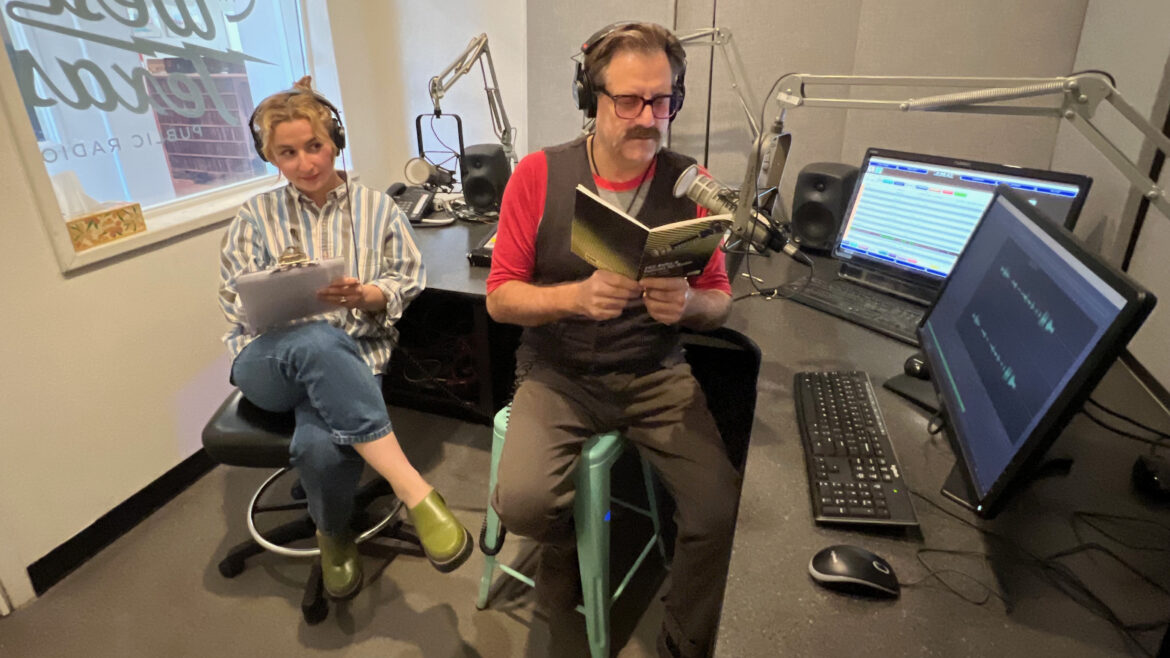Marfa Public Radio podcast turns dull documents into bedtime fare

Marfa Public Radio
Zoe Kurland and Christopher Dyer record an episode of “Marfa Public Radio Puts You to Sleep.”
While some podcasts keep listeners on the edge of their seats, Marfa Public Radio took a different approach — a podcast designed to go with a pillow and a warm blanket.
The station’s Marfa Public Radio Puts You to Sleep, a pledge-drive special released in October, features station staffers reading snooze-worthy documents related to public broadcasting and the details of running a radio station. Featured texts on the show’s 10 episodes, released all at once, included NPR’s style guide and the 1967 Public Broadcasting Act.
The idea for the podcast grew out of the many sleep and meditation apps and podcasts that rose to prominence during the pandemic. Marfa Public Radio Producer Zoe Kurland and Operations & Traffic Coordinator Christopher Dyer, the podcast’s hosts, spent a lot of time on apps like Calm and Headspace to get ideas for scripts and episode intros that are both relaxing and humorous.
“I think in public media we take ourselves really seriously, but the original spirit of public radio was to kind of hit all the notes of human experience, and humor is one of them,” said Elise Pepple, the station’s executive director. “We’re really trying to think about ‘What does public media look like now, at this stage in time?’ and this was a way for us to express our personality, which we hope has a sense of humor, we hope is creative, we hope is relevant.”
Kurland and Dyer echoed Pepple’s sentiments. “I think we both love goofy, wacky projects, and this was such a great idea on Elise’s part,” Kurland said. “The fact that we got to really run with it and that she gave us sort of carte blanche was really exciting.”
So many synonyms for ‘calm’
Each episode begins with tranquil harp music, followed by an intro read by Kurland and Dyer in a soft, relaxing tone. In the episode “The Texas Administrative Code Read by Mitch,” Dyer tells listeners he is “here to provide you with the tools to build a castle of sleep — a fortified compound of peace and slumber, where no distracting thoughts can get around the moat of ethereal waves.”
Dyer said that he and Kurland, who previously collaborated on several projects, were intent on making each other laugh as they created the show. Kurland “would write these intros and just hand me the script, and then I have to read something about ‘liminal tranquility’ or something like that,” said Dyer, laughing.
“There’s so many synonyms for the word ‘calm,’ which is amazing,” Kurland added.
According to Kurland, Marfa Public Radio Puts You To Sleep has garnered a lot of attention from both the station’s audience as well as other public media organizations. “We all interface with these manuals and different things every day, and the fact that we decided to make that into content, I think people are like, ‘Oh, that’s a really neat idea. I wonder how we might be able to apply that to our operation,’” she said.
The podcast also shows listeners what it takes to run a public radio station, Pepple said. “When you’re a listener to public radio, you can’t really tell by listening what goes on behind the scenes, and especially for small stations and rural stations, it’s really a nonstop effort by everyone to make the station operate,” she said. “I don’t think people necessarily think about the fact that stations don’t sleep.”
Marfa Public Radio hadn’t planned on a second season of the podcast but is now considering releasing bonus episodes based on audience feedback. One inspired listener was Julia Barton, a VP and executive editor at podcast company Pushkin Industries, who wrote a paper about the podcast for an MIT class as part of her Nieman Fellowship.
“The effect is, at least for this listener who’s worked at local public radio stations, hilarious and cathartic as a metacommentary on broadcast’s regulatory super-structure (which is rarely consulted by broadcasters, in my experience),” Barton wrote. “The podcast also serves as meta-commentary on the tensions between the highly regulated and time-scheduled world of analog broadcast, and the looser, exploratory production model that brought about genres such as ‘sleep podcasting.’”
In an email to Current, Barton wrote, “I’ve been studying how broadcast history informs audio practices and narrative conventions today, and Marfa Public Radio’s sleep podcast perfectly highlighted, in its ironic way, some of those connections. Also I couldn’t stop laughing while listening to it!”
Barton’s interest led to a collaboration with the podcast. To be “super meta,” Dyer said, “we’re going to make a bonus episode where she’s going to read that paper about a podcast that now is a part of that podcast.”
Correction: Due to an editing error, an earlier version of this article incorrectly said that Julia Barton wrote a paper about Marfa Public Radio Puts You to Sleep for a class at Harvard. It was for a class at MIT.






